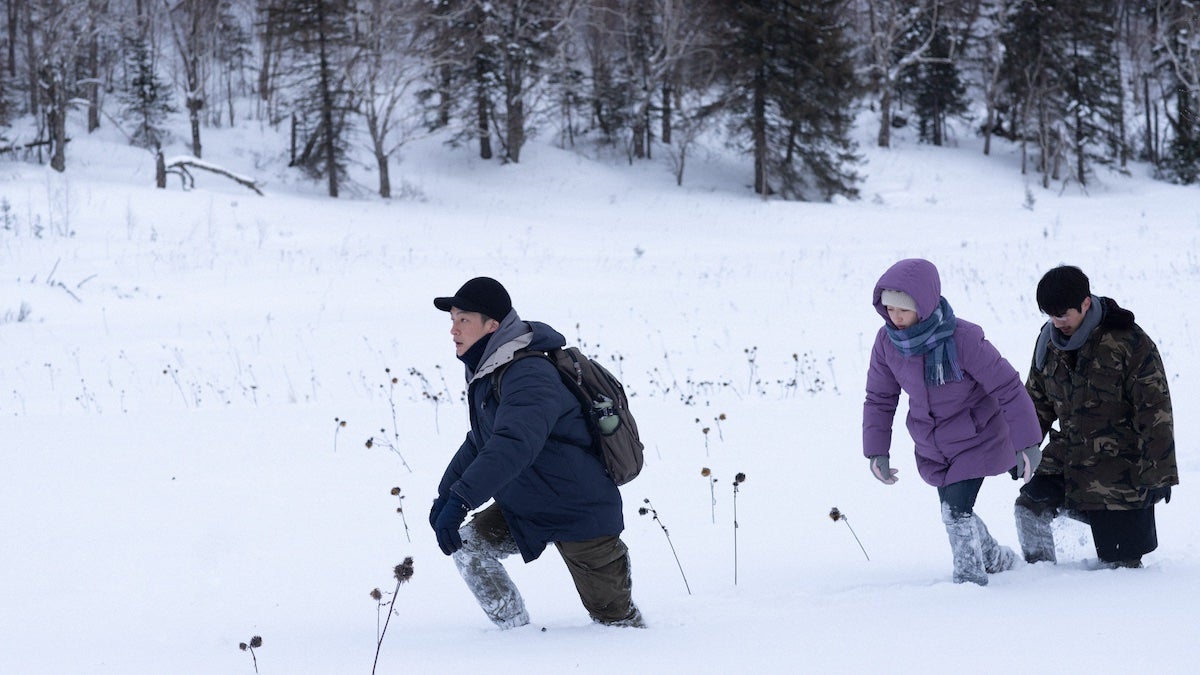
You’d expect a movie called “The Breaking Ice” to be cold and Anthony Chen’s gentle drama about three isolated young people finding moments of connection definitely stays away from passionate and heated statements. But it’d be a mistake to think that Chen’s restraint comes at the expense of feeling, because “The Breaking Ice” is one of the most beautifully evocative films to screen during the first few days of this year’s Cannes Film Festival.
A luminous “Jules and Jim” riff with a stunning visual design and a real purpose to its apparent aimlessness, “The Breaking Ice” screened on Sunday in the Un Certain Regard section at Cannes, bringing the Singaporean director back to the festival where he won the Camera d’Or for “Ilo Ilo” in 2013, and also appeared as part of the COVID-era anthology film “The Year of the Everlasting Storm” in 2021.
“The Breaking Ice” begins with a fascinating shot of workers cutting ice blocks from a frozen lake. The first of many striking images, it’s also a bit of misdirection – because then a bus drives across a bridge over the lake, the camera cuts inside the bus and we’re with a tour group traveling to traditional Korean sites in the Chinese city of Yanji, just over the border from North Korea. The tour is led by Nana (Zhou Dongyu, “Better Days”), a young woman who is all perkiness and light when she’s in front of the tourists, but sadder when she turns off her microphone.
The activity on the bus is intercut with a hotel banquet hall, where a young man, Haofeng (Chinese box-office star Liu Haoran), sits in front of a giant mural of a snowbound lake. He’s at a traditional Korean wedding in Yanji, where half the population speaks Korean. He seems to be a wallflower and he’s continually getting calls from a mental health center saying he missed his last appointment. “Wrong number,” he replies.
When Haofeng goes to the roof of the building and looks over the edge, it’s hard to imagine that he won’t jump – if not immediately, then eventually. But he sees the bus from his perch above the hotel parking lot and decides to join the tour since he’s got an extra day before he needs to fly back to Shanghai. Once on board he stands out because of his solitude, until he sits on a bench with Nana as she takes a cigarette break and starts a conversation that is as desultory as their lives seem to be.
“How long have you been a tour guide?” he asks.
“Three years,” she says.
“Do you like it?”
“What?”
“Do you like it?”
“Whether I like it or not, I have to do it.”
At this point, “The Breaking Ice” feels as if it’ll be a movie about two lonely people connecting, but when the bus stops at a restaurant we meet Xiao (Qu Chuxiao, “The Wandering Earth”), a cook who clearly has a romantic interest in Nana. The lost couple becomes an adrift trio (or maybe two isolated people and a goofy sidekick) whose drunken night together results in Haofeng missing his plane and deciding to hang around.
And hanging around is pretty much what happens for the rest of “The Breaking Ice.” They go to the North Korean border, walk on a frozen lake and listen to the ice cracking beneath their feet, make an abortive attempt to shoplift in a bookstore and gradually learn about each other. Nana is a medal-winning figure skater who fled the sport after an ankle injury, Haofeng was driven by his mother to study hard but found no relief in material success.
“The Breaking Ice,” though, can’t be summed up in plot points. As Nana, Haofeng and Xiao meander through the next few days, so does the movie. But Chen’s movie does a lovely job of meandering, and the film is shot through with images that stick: people skating on a frozen lake lit by shafts of light from the distance; a barrage of color in a crowded nightclub; deer and monkeys in a zoo in the early morning hours, illuminated only by cellphone flashlights; light slanting through the windows of a stark modern high-rise hotel; the shadow of a truck against the pavement; an embrace through a shower curtain.
Mostly, there’s ice. Sheets of ice on frozen lakes, in murals and paintings, in an ice maze lit from within, even in Haofeng’s mouth as he compulsively pulls cubes from his drink and chomps down on them.
The action, if you can call it that, is often as not set to Kim Leonn’s bare and evocative music, which mixes gentle chords that hang in the air with more assertive moments that, like the film, somehow manage to be simultaneously meditative and propulsive.
The aimless idylls eventually become a snowbound and potentially dangerous pilgrimage to Changbai Mountain and Heaven Lake, where death wishes and moments of near-miraculous salvation coexist. A lot goes unsaid and undone, even as the film moves through almost as many endings as “The Return of the King.” But that’s the point, and the beauty, of “The Breaking Ice,” which paints a rich picture of full lives using little more than pauses, glances and a frozen landscape that says volumes without speaking.













